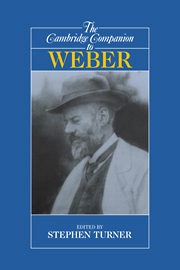Book contents
- Frontmatter
- Introduction
- PART I RATIONALITY, RATIONALIZATION, AND PSYCHOLOGY
- PART II POLITICS AND CULTURE
- PART III RELIGIONS AND THEIR ECONOMIC ETHICS
- PART IV LAW AND ECONOMICS
- 11 Max Weber as legal historian
- 12 From agrarian history to cross-cultural comparisons: Weber on Greco-Roman antiquity
- 13 Max Weber as economist and economic historian
- Further reading
- Index
11 - Max Weber as legal historian
from PART IV - LAW AND ECONOMICS
Published online by Cambridge University Press: 28 May 2012
- Frontmatter
- Introduction
- PART I RATIONALITY, RATIONALIZATION, AND PSYCHOLOGY
- PART II POLITICS AND CULTURE
- PART III RELIGIONS AND THEIR ECONOMIC ETHICS
- PART IV LAW AND ECONOMICS
- 11 Max Weber as legal historian
- 12 From agrarian history to cross-cultural comparisons: Weber on Greco-Roman antiquity
- 13 Max Weber as economist and economic historian
- Further reading
- Index
Summary
Max Weber was initially trained in both law and history and he drew extensively on examples from legal history in constructing his later sociological works. Yet he was not, properly speaking, a legal historian. In fact, as we shall show, the superimposition upon legal history of his sociological categories of “ideal types” of legal authority resulted in serious distortions at the same time that it led to some important insights. His sharp separation of “fact” from “value,” and his relegation of law to the realm of “fact,” led him to overlook entirely the importance of legal values in two of his best known socio-historical studies, The Protestant Ethic and the Spirit of Capitalism and The City. In the background of his entire sociology of law was an oversimplified historiography in which the history of law in the West was viewed as a progression from a “feudal,” “traditional,” “personal” type to a “capitalist,” “formal-rational,” and “bureaucratic” type, with the prospect of an emerging “socialist,” “substantively rational” type.
Weber's background in the law
Max Weber was born into a family that “was steeped in the intellectual culture of the law.” His father was a lawyer as well as a politician, who served as a member of the National Liberal Party in the German Reichstag from 1872 to 1884. The son pursued a legal education from the time he first matriculated at Heidelberg University in 1882, where, in his first semester, he enrolled in a course entitled Roman Law: Pandects and Institutes. He later continued his law studies at the University of Berlin, under the tutelage of some of the leading lights of the late nineteenth-century German legal academy.
- Type
- Chapter
- Information
- The Cambridge Companion to Weber , pp. 221 - 239Publisher: Cambridge University PressPrint publication year: 2000
- 2
- Cited by

